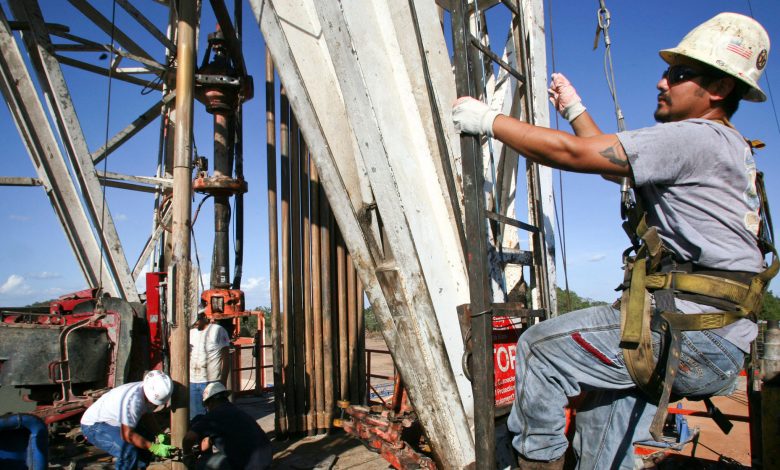Oil jumps 13% in fifth day of gains on demand recovery and production cuts

[ad_1]
Workers operate a drilling rig for an EBR Energy LP natural gas well near Columbus, Texas.
Scott Dalton | Bloomberg | Getty Images
Oil prices surged on Tuesday as optimism around ongoing production cuts and a recovery in demand with the reopening of economies around the world pushed prices higher.
West Texas Intermediate, the U.S. benchmark, jumped 13%, or $2.66, to trade at $23.05 per barrel. The contract gained 3.08% on Monday — closing above $20 for the first time since mid-April — and is on pace for its fifth-straight day of gains for the first time since February. International benchmark Brent crude traded 7.8% higher at $29.32 per barrel, and is also pacing for its fifth-consecutive positive session.
“One thing is clear, the demand bottom is behind us, and this is manifesting in oil prices which are on the rise,” said Per Magnus Nysveen, Rystad Energy’s head of analysis. The “key reason behind the price strengthening is regional traffic data, which indicate the demand bottom is behind us,” he added.
Oil demand has fallen off a cliff as the coronavirus pandemic spread around the globe, forcing billions of people to remain inside and bringing air travel to a near standstill. By some estimates as much as a third of worldwide demand was erased in April.
But with economies gradually starting to reopen — a number of U.S. states, including Florida, began phase one reopening plans on Monday, while millions of Italians will return to work this week — investors believe there will be an uptick in demand.
“The reopening of economies has injected a degree of cautious optimism back into an oil market that plunged to historic lows only weeks ago,” RBC analyst Michael Tran said in a note to clients Tuesday.
“There’s reason to believe the worst of the demand destruction is behind us. Commentary from multiple companies pointed to an improvement in US demand at the end of April, particularly for gasoline,” added Stacey Morris, director of research at Alerian.
The improving demand outlook comes as producers have scaled back production, which has also supported prices. The historic cut from OPEC and its oil-producing allies, which takes 9.7 million barrels per day offline, went into effect on May 1. Norway and Canada have also curbed production.
In the U.S., data from the Energy Information Administration showed that weekly production averaged 12.1 million bpd for the week ending April 24, roughly 1 million bpd below the all-time high levels from March. Exxon, Chevron and ConocoPhillips are among the companies that have cut production in the face of depressed prices.
Oil’s recent strength barely puts a dent in its historic fall, however. Both WTI and Brent are firmly in a bear market, plunging 68% and 62%, respectively, from their 52-week high levels. The decline has also been swift — WTI’s 52-week high of $65.65 is from Jan. 8.
And traders caution that the road to recovery for oil prices will be long and uncertain. Even with global producers scaling back operations, global storage is rapidly filling and some believe tank tops could be reached within weeks.
“The path to recovery for oil demand in the US and globally is still up in the air,” Morris said.
And Nysveen believes the “market is still vulnerable.”
“The existing problems did not magically get resolved, the storage constraint is still there … We remain very cautious short term, but our view is that we will see a price recovery on the longer term,” he added.
Source link






